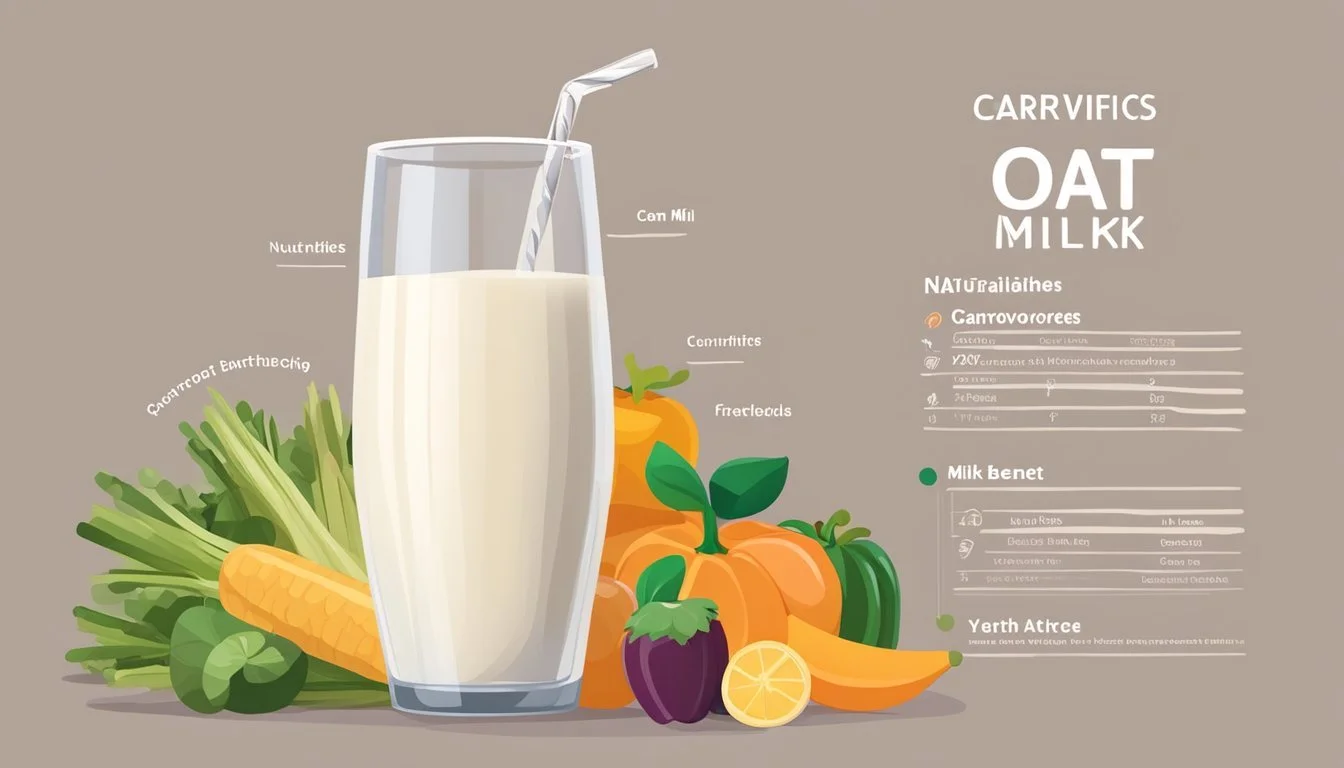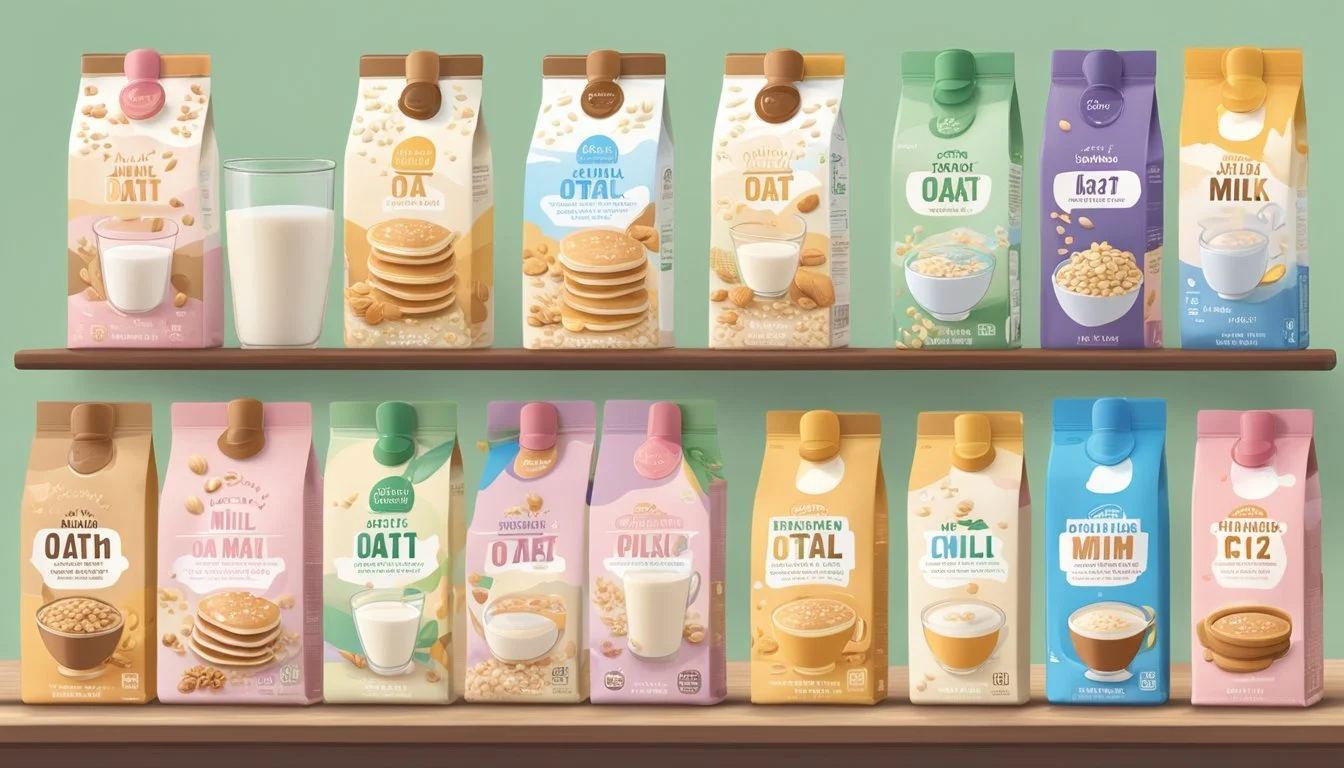Exploring the Nutritional Value of Oat Milk for Carnivores
An In-Depth Analysis
The Carnivore Diet, known for its emphasis on animal-derived products, naturally raises questions about the viability of incorporating plant-based alternatives like oat milk. As more people explore diverse dietary options, understanding whether oat milk fits within the strict parameters of a meat-focused regimen becomes essential.
However, oat milk, while rich in essential vitamins like calcium, copper, and selenium, is primarily composed of carbohydrates—a macronutrient typically minimized in a carnivore diet. For those committed to a carnivorous way of eating, oat milk generally does not align with the diet’s low-carbohydrate, animal-based principles. The caloric and carbohydrate content of oat milk also contrasts sharply with the nutrient profile sought by adherents of the carnivore lifestyle.
Interested readers will discover how oat milk stands nutritionally against the rigorous standards of the Carnivore Diet. The discussion delves into the specifics of its composition, helping enthusiasts make informed choices about their dietary preferences.
Understanding Oat Milk
Oat milk is a popular plant-based milk made from oats. It offers a unique nutritional profile that includes vitamins, minerals, and fiber. This makes it an intriguing option for those looking to diversify their dairy alternatives.
What Is Oat Milk?
Oat milk is created by blending oats with water and then straining the mixture to remove the solid bits. This creates a creamy, slightly sweet liquid that can be used in place of cow’s milk. Unlike almond or soy milk, oat milk has a naturally thicker texture.
The base ingredient, oats, undergoes a process where enzymes break down the starches. This releases sugars that give oat milk its mild sweetness. Commonly, manufacturers fortify oat milk with vitamins and minerals to enhance its nutritional value.
Nutritional Profile of Oat Milk
Oat milk generally contains around 120 calories per cup, though this number can vary by brand. It typically includes a higher carbohydrate content compared to other plant-based milks. A standard serving provides about 16 grams of carbohydrates, including fiber, which can help with digestion.
Nutritional Content (per cup):
Calories: ~120
Carbohydrates: ~16g
Fat: ~2-4g
Protein: ~2-3g
Fiber: ~2g
In addition, oat milk is often fortified with essential vitamins and minerals such as B12, vitamin D, calcium, and potassium. This makes it a valuable source of nutrients, especially for those who follow a plant-based diet.
Benefits of Oat Milk Over Cow’s Milk
For individuals who are lactose intolerant or allergic to dairy, oat milk provides a suitable alternative. It is naturally free from lactose, nuts, and soy, making it hypoallergenic for individuals with specific dietary restrictions.
Oat milk typically has less fat compared to whole cow’s milk. This can be beneficial for those monitoring their fat intake. Additionally, the fiber content in oat milk aids in blood sugar management and supports healthy digestion.
It also boasts a lower environmental impact. Producing oat milk generally requires less water and resources compared to cow’s milk, making it a more sustainable choice. This makes it appealing not only for health reasons but also for environmental considerations.
Nutritional Comparison
When comparing oat milk to cow's milk and other plant-based milks, there are distinct nutritional differences. The analysis of protein, fat, vitamins, and minerals reveals how oat milk stacks up against these alternatives.
Oat Milk vs. Cow’s Milk
Oat milk and cow’s milk differ significantly in nutrient composition. Cow’s milk provides more protein, approximately 8 grams per cup compared to 2-4 grams in oat milk. Cow’s milk is also a rich source of calcium and vitamin B12.
Cow’s milk typically contains about 8 grams of fat per cup, while oat milk usually contains 2.5-8 grams, depending on the brand. Oat milk has more carbohydrates, with around 16 grams per cup, compared to 12 grams in cow's milk. For those who are lactose-intolerant, oat milk presents a lactose-free alternative. Fortified oat milk can also provide added vitamins like vitamin D and riboflavin, similar to cow’s milk.
Oat Milk vs. Other Plant-Based Milks
When compared to other plant-based milks like almond milk and soy milk, oat milk stands out in a few areas. Soy milk typically provides more protein, around 7 grams per cup, while almond milk offers much less, about 1-2 grams per cup. Oat milk's 2-4 grams of protein per cup is moderate in this context.
Oat milk is rich in dietary fiber, offering a benefit that many other plant-based milks lack. The carbohydrate content of oat milk is higher compared to almond milk, but soy milk has comparable amounts of carbohydrates. Regarding fat content, almond and soy milks generally contain lower fat levels than oat milk. Fortified oat milk, similar to soy and almond milks, provides essential nutrients such as calcium, vitamin D, and vitamin A, making it a competitive choice in the plant-based category.
Using this nutritional comparison, individuals can better decide which type of milk fits their dietary needs and preferences.
Health Benefits and Considerations
Oat milk offers various health benefits, especially for those looking to avoid dairy or other animal products. There are also specific considerations that carnivores might need to keep in mind when incorporating oat milk into their diet.
Health Benefits
Oat milk is rich in vitamins and minerals such as calcium, which is crucial for bone health. It also contains potassium and manganese. One of the key components is beta-glucan, a type of soluble fiber that helps reduce cholesterol levels and support heart health.
It is an excellent choice for those with lactose intolerance or dairy allergies, as it is naturally lactose-free. For individuals following a plant-based or vegan diet, oat milk provides a nutritious alternative to animal-based milk.
Oat milk contains iron, aiding in preventing anemia, and is generally low in fat and calories, making it a good option for weight management. Its fiber content, particularly beta-glucan, can also help in maintaining stable blood sugar levels, which is beneficial for those managing diabetes.
Potential Concerns for Carnivores
Carnivores may find that oat milk lacks protein compared to dairy milk or meat-based products. Though it provides certain nutrients, the protein content is lower, which might require supplementation from other sources for a balanced diet.
Oat milk can sometimes contain added sugars for taste, potentially impacting blood sugar levels. It's advisable to check labels for unsweetened versions if managing diabetes or looking to reduce sugar intake.
Though gluten-free oats are available, cross-contamination during processing can be a concern for those with gluten intolerance or celiac disease. It's important to ensure that the oat milk is specifically labeled gluten-free.
For those who consume significant amounts of dairy or meat, the lower fat content in oat milk might not provide the necessary fats required in their diets. They may need to seek additional sources of healthy fats to maintain nutritional balance.
Dietary and Allergy Information
Oat milk is known for its versatility in accommodating various dietary restrictions and being a safe choice for those with specific allergies. This section delves into its compatibility with restricted diets and details crucial allergen information.
Suitability for Restricted Diets
Oat milk is an excellent option for lacto-vegetarians, vegans, and vegetarians due to its plant-based origin. Unlike traditional dairy milk, it contains no animal products, making it suitable for those avoiding animal-derived ingredients.
For individuals with lactose intolerance, oat milk provides a non-dairy alternative that is naturally free of lactose, preventing digestive discomfort associated with lactose ingestion.
Those following a gluten-free diet must be cautious, as oats can be contaminated with gluten during processing. Choosing oat milk made from certified gluten-free oats ensures it is safe for individuals with gluten sensitivity or celiac disease.
Allergen Information
Oat milk stands out as a safe option for individuals with multiple food allergies. It is naturally free of nuts, making it a good substitute for those with nut allergies who cannot consume almond or cashew milk.
Additionally, it does not contain soy, another common allergen, making it suitable for those allergic to soy-based products.
Cross-contamination is always a concern. Opt for brands that explicitly state they use certified gluten-free oats to avoid any traces of gluten.
For those concerned about potential allergens, double-checking ingredient lists and manufacturer claims can ensure safe consumption. Oat milk provides a nutritionally rich, allergen-friendly alternative to traditional milk, catering to various dietary needs effectively.
Environmental and Ethical Considerations
Oat milk offers both environmental benefits and ethical advantages compared to traditional cow’s milk. By focusing on its carbon footprint, land and water usage, and animal welfare, consumers can better understand the value of choosing oat milk.
Sustainability of Oat Milk Production
Oat milk production is known for its lower carbon footprint. It requires less land and water resources compared to cow's milk. The process of growing oats generally demands fewer pesticides and fertilizers, making it more environmentally friendly.
Additionally, oats can be grown in regions unsuitable for other crops, which helps in diversifying agricultural practices. This minimizes the risk of monoculture and promotes sustainable farming. Oat milk also has a longer shelf life, reducing food waste, which is significant for both environmental and economic reasons.
Ethical Aspects of Choosing Oat Milk
Choosing oat milk aligns well with ethical food-choice motives. It supports a vegan diet, which avoids animal exploitation and has been linked to better animal welfare. The plant-based nature of oat milk means it does not contribute to the dairy industry's negative impact on animals.
Moreover, the production of oat milk demonstrates a commitment to sustainable ethical practices. By selecting oat milk, consumers contribute less to greenhouse gas emissions, and methane production, which is prevalent in dairy farming. This ethical choice is crucial for those committed to reducing their ecological footprint and advocating for animal rights.
Choosing oat milk represents a mindful decision that benefits both the planet and animal welfare, embodying principles of sustainability and ethical consumption.
Oat Milk Varieties and Uses
Oat milk, an increasingly popular dairy-free alternative, comes in various forms to cater to different dietary preferences and culinary needs. Its applications range from beverages to cooking and baking.
Different Types of Oat Milk
Oat milk is available in several varieties, each designed to meet specific requirements. Unsweetened oat milk contains no added sugars, making it suitable for those watching their sugar intake. Fortified versions provide additional nutrients, such as vitamin D, B12, and calcium, which are often found in cow's milk.
Brands like Oatly offer multiple options, including fully organic versions and those made with whole grain oats. There is also whole milk oat milk, which has a richer, creamier texture due to the inclusion of more oats per serving. Homemade oat milk can be a cost-effective and customizable option, though it may lack the nutrient fortification found in store-bought versions.
Culinary Applications
Oat milk’s creamy texture and neutral taste make it highly versatile in the kitchen. It can be used as a one-to-one substitute for cow's milk in most recipes. Baristas value it for creating frothy lattes and cappuccinos, comparable to dairy milk counterparts.
In cooking, oat milk enhances soups, sauces, and dressings without altering the intended flavors. It’s an excellent choice for plant-based and dairy-free baking, offering moisture and a subtle sweetness. Grocery stores stock various brands and types, ensuring easy access for consumers seeking to incorporate this plant-based milk into their diets. Avoid oat milk with added sugars or unnecessary oils if dietary purity is a priority.
Buying and Storing Tips
When it comes to buying and storing oat milk, understanding the basics can help ensure you get the best value and maintain its quality and freshness.
Choosing the Right Oat Milk
When choosing oat milk, it's important to consider factors such as dietary restrictions and personal preferences. Look for labels that specify whether the product is unsweetened, fortified with vitamins such as B12, and gluten-free if necessary.
Oat milk can be widely available in most grocery stores, typically located alongside other plant-based milk alternatives. Selections can vary between shelf-stable and refrigerated options, so pay attention to where you find them in the store.
For those who are conscious of additives, read the ingredient list thoroughly. Opt for brands with minimal additives to avoid extra sugars or preservatives. For instance, some brands fortify their oat milk with calcium and vitamin D, which could be beneficial depending on individual dietary needs.
Storage Recommendations
Proper storage of oat milk is crucial to maintaining its quality. Homemade oat milk should be stored in a glass bottle or jar with a tight-fitting lid. It must be kept in the refrigerator and typically lasts for 3-5 days.
For commercially bought oat milk, check the label for specific storage instructions. Shelf-stable variants can be stored at room temperature until opened. Once opened, they need to be refrigerated and consumed within approximately 7-10 days.
Always ensure to shake the bottle well before use, as separation can occur. Marking the opening date on the container is also recommended to keep track of freshness.
By following these tips on selecting and storing oat milk, anyone, including those with specific dietary restrictions, can enjoy the benefits of this plant-based milk alternative.








